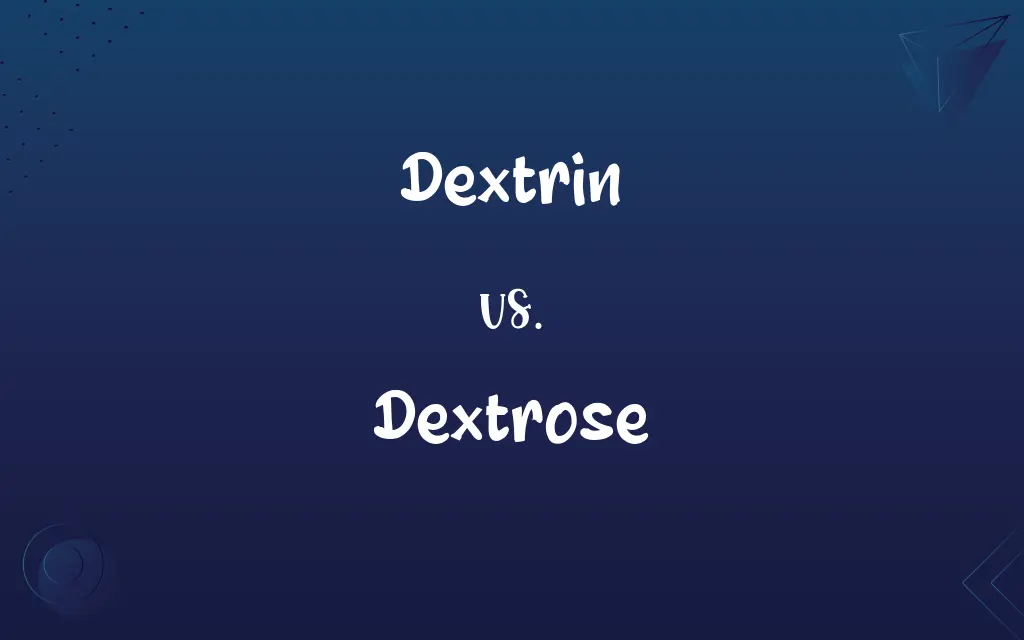Dextrin vs. Dextrose: Know the Difference

By Shumaila Saeed & Dua Fatima || Updated on March 5, 2024
Dextrin is a group of low-molecular-weight carbohydrates produced by the hydrolysis of starch, while dextrose, essentially glucose, is a simple sugar with significant metabolic importance.

Key Differences
Dextrin is derived from starch through a process called hydrolysis, where starch molecules are broken down into shorter chains. These chains can vary in length, leading to dextrins with different properties. On the other hand, dextrose, known chemically as D-glucose, is a monosaccharide or simple sugar. It's one of the primary sources of energy for cells and is found naturally in fruits and honey.
Shumaila Saeed
Mar 05, 2024
While dextrins are not sweet and are used primarily as water-soluble glues, thickeners, or fillers in processed foods, dextrose is naturally sweet and plays a crucial role in the food industry as a sweetener. It's also used medically to treat hypoglycemia and provide energy in intravenous nutrition solutions.
Dua Fatima
Mar 05, 2024
Dextrin can act as a dietary fiber, contributing to the bulk in processed foods and aiding in digestive health. Dextrose, being a simple sugar, is absorbed directly into the stream, providing an immediate source of energy but can contribute to weight gain and other health issues if consumed in excess.
Shumaila Saeed
Mar 05, 2024
In terms of nutritional value, dextrins are considered to have a minimal direct nutritional contribution. However, they can benefit gut health by promoting the growth of beneficial bacteria. Dextrose, as a form of glucose, is essential for energy but should be consumed within the body's metabolic needs to avoid negative health effects.
Shumaila Saeed
Mar 05, 2024
Comparison Chart
ADVERTISEMENT
Source
Hydrolysis of starch
Naturally in fruits, honey, and commercially through starch hydrolysis
Dua Fatima
Mar 05, 2024
Use in Food Industry
Thickeners, fillers, adhesives
Sweeteners, energy sources
Shumaila Saeed
Mar 05, 2024
Nutritional Role
Dietary fiber, minimal direct nutritional value
Immediate energy source, nutritional value as a carbohydrate
Shumaila Saeed
Mar 05, 2024
Dextrin and Dextrose Definitions
Dextrin
A complex carbohydrate derived from the hydrolysis of starch.
The food industry uses dextrin as a thickener in sauces and soups.
Shumaila Saeed
Mar 05, 2024
ADVERTISEMENT
Dextrose
A simple sugar chemically identical to glucose.
Dextrose is used in baking to sweeten bread.
Hifza Nasir
Mar 05, 2024
Dextrin
A water-soluble glue.
Dextrin-based adhesives are used in label applications.
Shumaila Saeed
Mar 05, 2024
Dextrose
Used to treat hypoglycemia.
Dextrose tablets are used to quickly raise sugar levels.
Shumaila Saeed
Mar 05, 2024
Dextrin
A product of starch hydrolysis.
The production of dextrin involves breaking down starch into smaller molecules.
Dua Fatima
Mar 05, 2024
Dextrose
A natural component of fruits and honey.
The dextrose in fruit contributes to its sweetness.
Shumaila Saeed
Mar 05, 2024
ADVERTISEMENT
Dextrin
A dietary fiber.
Dextrin can aid digestion by increasing dietary bulk.
Shumaila Saeed
Mar 05, 2024
Dextrose
A primary source of energy for the body.
Dextrose solutions are administered intravenously to patients needing quick energy.
Shumaila Saeed
Mar 05, 2024
Dextrin
A filler in processed foods.
Dextrin is often added to packaged foods to improve texture.
Shumaila Saeed
Mar 05, 2024
Dextrose
A commercial sweetener.
Dextrose is added to candies and desserts for sweetness.
Dua Fatima
Mar 05, 2024
Dextrin
(carbohydrate) Any of a range of oligomers of glucose, intermediate in complexity between maltose and starch, produced by the enzymatic hydrolysis of starch; used commercially as adhesives.
Shumaila Saeed
Oct 19, 2023
Dextrose
The naturally-occurring dextrorotatory form of glucose monosaccharide molecule.
Shumaila Saeed
Oct 19, 2023
Dextrin
Any of various soluble polysaccharides obtained from starch by the application of heat or acids and used mainly as adhesives and thickening agents.
Shumaila Saeed
Oct 19, 2023
Dextrose
A sirupy, or white crystalline, variety of sugar, C6H12O6 (so called from turning the plane of polarization to the right), occurring in many ripe fruits, and also called glucose. Dextrose and levulose are obtained by the inversion of cane sugar or sucrose, and hence the mixture is called called invert sugar. Dextrose is chiefly obtained by the action of heat and acids on starch, and hence called also starch sugar. It is also formed from starchy food by the action of the amylolytic ferments of saliva and pancreatic juice.
Shumaila Saeed
Oct 19, 2023
Dextrin
A translucent, gummy, amorphous substance, nearly tasteless and odorless, used as a substitute for gum, for sizing, etc., and obtained from starch by the action of heat, acids, or diastase. It is of somewhat variable composition, containing several carbohydrates which change easily to their respective varieties of sugar. It is so named from its rotating the plane of polarization to the right; - called also British gum, Alsace gum, gommelin, leiocome, etc. See Achroödextrin, and Erythrodextrin.
Shumaila Saeed
Oct 19, 2023
Dextrose
The dextrorotatory form of glucose, C6H12O6·H2O, the naturally occurring form of glucose found in all organisms. Also called dextroglucose.
Shumaila Saeed
Oct 19, 2023
Repeatedly Asked Queries
What is dextrin?
Dextrin is a group of complex carbohydrates produced by the hydrolysis of starch, used in the food industry as thickeners and fillers.
Dua Fatima
Mar 05, 2024
What is dextrose?
Dextrose is a simple sugar, chemically identical to glucose, used as a sweetener and an energy source in food and medical treatments.
Shumaila Saeed
Mar 05, 2024
How are dextrin and dextrose produced?
Dextrin is produced by breaking down starch through hydrolysis, while dextrose can be naturally found or produced through the hydrolysis of starch.
Shumaila Saeed
Mar 05, 2024
Can dextrin and dextrose be used interchangeably?
No, they serve different purposes; dextrin is used as a fiber or adhesive, while dextrose is a sweetener and energy source.
Dua Fatima
Mar 05, 2024
Where is dextrose commonly used?
Dextrose is used in foods and drinks as a sweetener and in medical treatments to provide energy or treat hypoglycemia.
Shumaila Saeed
Mar 05, 2024
Are dextrin and dextrose sweet?
Dextrin is not sweet, whereas dextrose is naturally sweet.
Shumaila Saeed
Mar 05, 2024
Do dextrin and dextrose have nutritional value?
Dextrin serves as a dietary fiber with minimal direct nutritional value, while dextrose is an essential carbohydrate providing energy.
Shumaila Saeed
Mar 05, 2024
Can dextrin aid digestion?
Yes, as a dietary fiber, dextrin can help increase dietary bulk and aid in digestion.
Shumaila Saeed
Mar 05, 2024
Can consuming dextrin have side effects?
Generally, dextrin is safe, but excessive intake may lead to gastrointestinal issues like gas or bloating.
Hifza Nasir
Mar 05, 2024
Is dextrose bad for health?
In moderation, dextrose is an essential energy source, but excessive consumption can lead to health issues like weight gain and diabetes.
Hifza Nasir
Mar 05, 2024
Are there different types of dextrin?
Yes, dextrins vary in molecular size and structure depending on the degree of hydrolysis.
Shumaila Saeed
Mar 05, 2024
Is dextrose natural or synthetic?
Dextrose can be naturally found in fruits and honey or produced synthetically from starch.
Shumaila Saeed
Mar 05, 2024
Where is dextrin commonly used?
Dextrin is used in processed foods as a thickener, filler, and adhesive.
Shumaila Saeed
Mar 05, 2024
Is dextrose suitable for diabetics?
Diabetics should carefully manage dextrose intake as it directly affects sugar levels.
Hifza Nasir
Mar 05, 2024
How does the body use dextrose?
The body uses dextrose as a primary energy source, rapidly absorbing it into the body.
Shumaila Saeed
Mar 05, 2024
Share this page
Link for your blog / website
HTML
Link to share via messenger
About Author
Written by
Shumaila SaeedShumaila Saeed, an expert content creator with 6 years of experience, specializes in distilling complex topics into easily digestible comparisons, shining a light on the nuances that both inform and educate readers with clarity and accuracy.
Co-written by
Dua Fatima







































































